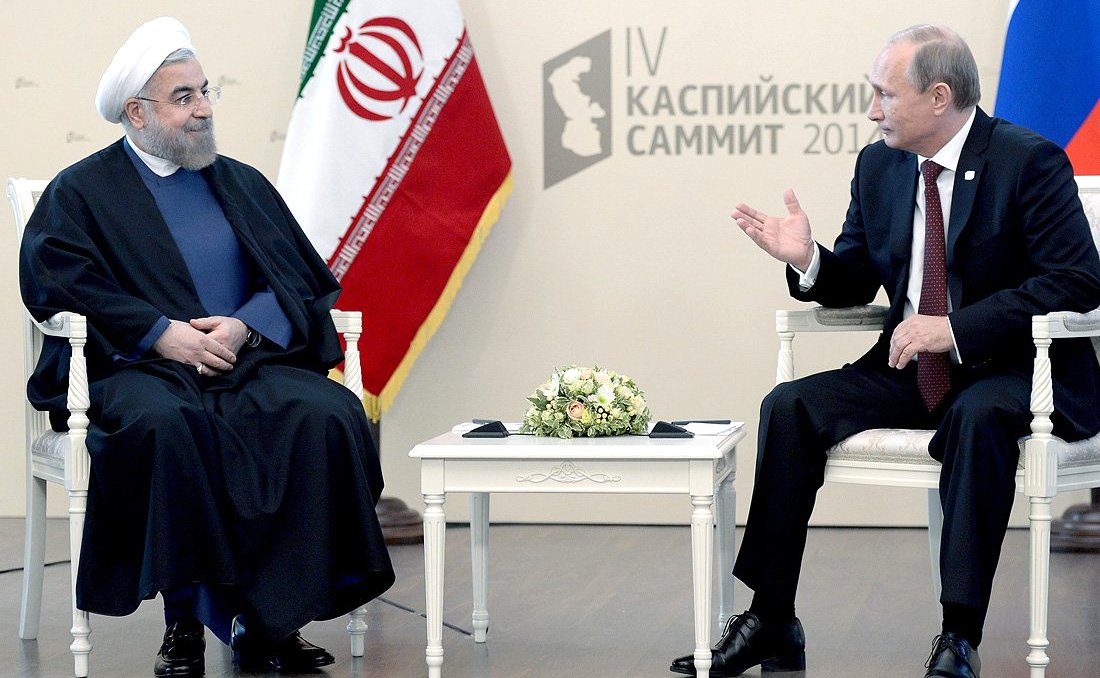 www.kremlin.ru
www.kremlin.ru
Disrupting the Russian-Iranian Rapprochement
By Katharine Nasielski / WiSe Fellow
The Syrian Civil War will have innumerable humanitarian and political consequences, but the increasingly close relationship between Russia and Iran in support of President Assad’s regime may be one of the most significant outcomes of this six-year war. While the two countries’ relationship has historically been transactional, cooperation over Syria seems to have led to a fundamental shift, with implications for the balance of power in the Middle East, the U.S. role in the region, and arms proliferation. The United States has, and must prioritize, policy options to mitigate this relationship from growing stronger and surpassing their short-term goals in Syria.
The relationship between Iran and Russia has never been built on trust. Since 1979, Iran has held a “No East, No West” policy. No country has seized more territory from Iran in recent centuries than Russia, and Iran has not fully forgiven Russia for its support of Iraq during the Iran-Iraq War. Tehran has consistently been used as a bargaining chip between Russia and the U.S., most notably in backroom negotiations in 1995 when Vice President Al Gore and Russian Prime Minister Chernomyrdin agreed to end arms sales to Iran without their knowledge or consent.
But now, U.S. policymakers are faced with the challenge of a fundamentally changed relationship between Iran and Russia derived from military coordination to prop up the Assad regime. Russia and Iran have been working in tandem to ensure that the Syrian government survives. Without their support, President Assad could not have remained in power. Iran’s ambitions for regional hegemony and to counter Saudi Arabia’s strength in the Middle East require Assad’s survival. Russia seeks a larger role in the Middle East and to limit America’s influence. While Russia may not necessarily be committed to President Assad’s personal maintenance of power, it views a continued Russian-Syrian alliance as critical for its access to this region and to the Mediterranean.
Because of these shared priorities with Russia, Iran appears to have diverted from “No East, No West.” In August 2016, Iran allowed Russia to use its Hamadan Air Base to take off and refuel in support of its joint military operations; no foreign power has been permitted to base forces in Iran since 1979. Russia has been training and providing weapons to Hezbollah, Iran’s proxy militia in Lebanon. Since the beginning of the war, Hezbollah has adapted from a small terrorist organization to a small-sized army, posing a direct threat to U.S. allies in Israel and Saudi. In the aftermath of the JCPOA, Iran and Russia signed a $10 billion arms deal, and Russia delivered S-300 missile systems that had been delayed due to international sanctions regimes.
But the U.S. has the power to drive a wedge between Iran and Russia’s blossoming relationship. Even though Iran and Russia might have similar visions of the Syrian conflict in the immediate term, their long-term regional goals differ significantly.
Iran is actively spreading its footprint across the region – from Hezbollah in Lebanon to Shi’ite militia groups in Iraq, Afghanistan, and to a lesser extent, Yemen. Iran seeks a weak Syria that it can control by incorporating its militia members into its decentralized proxy groups across the region with greater allegiance to Tehran than to a weak Syrian government. President Assad has shown a willingness to cater to the interests of Tehran and so Iran requires not just the survival of Syria as a country, but also the legitimacy of Bashar al-Assad.
Russia seeks to increase its influence in the Middle East and maintain a warm water port in the Mediterranean. To secure these goals, the war must end, the government (with or without Assad) must remain the legitimate sovereign of Syria, and Syrian institutions – in particular, the military – must remain sound. However, Russia cannot alienate powerful Gulf countries by aligning too closely with Iran if it wants to have influence across the Middle East. Promoting an end to the Syrian conflict that elevates either Iran’s control over Syria or supports Iran’s aim of regional hegemony would prevent Russia from having any influence with Sunni Arab countries.
While violence rages in Syria, and while the United States’ priority remains focused on fighting ISIS as opposed to negotiating a political solution with the Syrian government, Iran and Russia have no need to face the tensions in their long-term goals. It is to America’s benefit to speed up these debates. This can be accomplished by reengaging in negotiations in Geneva and by ensuring that the United States has a presence at all negotiations (as opposed to recent negotiations between Iran, Russia, and Turkey and without the U.S. in Astana). Although it may seem counter intuitive, Iran and Russia should be encouraged to take leadership roles in negotiations so they are forced to articulate and publicly reconcile these opposing interests.





